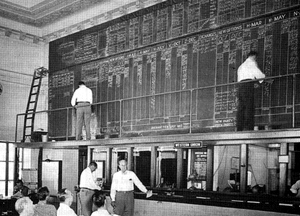
Memphis Cotton Exchange
Following the organization of cotton exchanges in New York (1870) and New Orleans (1871), Memphis cotton buyers pushed for an exchange in Memphis. Initial attempts to organize the institution failed, though, because most of the cotton factors feared that the proposed exchange would develop a “ring” for futures trading, as the New York and New Orleans exchanges had done. Many factors, who sold cotton on commission for planters, believed that speculation in futures depressed prices.
When the Memphis Cotton Exchange formally opened at the end of 1873, it established a “spot” market with no provision for trading in futures contracts. Cotton sent to Memphis was bought and sold on the spot. Apart from two short-lived ventures into futures trading, Memphis remained a spot market.
Members formulated rules to govern the buying and selling of cotton. The regulations standardized trade practices based on past customs, and the exchange established a reliable system for grading cotton. Violations of the rules were punishable by the revocation of membership. In order to insure compliance with the rules, members could not trade with nonmembers.
The exchange arranged to receive price quotations from all important cotton markets. It also kept members informed about crop conditions and other matters of interest. Cotton merchants who declined to join the exchange soon found they could not compete without access to the information.
Arbitration became another key function of the Memphis Exchange. The proliferation of verbal contracts, sales based on samples, and the many staple lengths and grades of cotton being traded resulted in numerous disputes. By keeping disagreements out of the courts the Memphis Cotton Exchange saved cotton merchants from expensive litigation. Relying on sales contracts based on honor rather than documents speeded up business transactions.
The Memphis Cotton Exchange promoted cotton bought and sold in its market and worked to increase the volume of cotton passing through its warehouses. In the past, Memphis cotton had often been marketed under the name of the port from which it was shipped. The exchange sent samples of the different grades of cotton traded in Memphis to Liverpool, New York, and New Orleans and requested separate quotes and prices for Memphis grades. To advertise their product, the exchange periodically gave a prize for the best bale of cotton received in the Bluff City and sent the prize-winning bale to fairs in the United States and Europe.
With the diversification of the Memphis economy, collection of cotton statistics by federal agencies, and a declining number of cotton-buying firms, the Memphis Cotton Exchange no longer sustains the commanding presence it once did.



